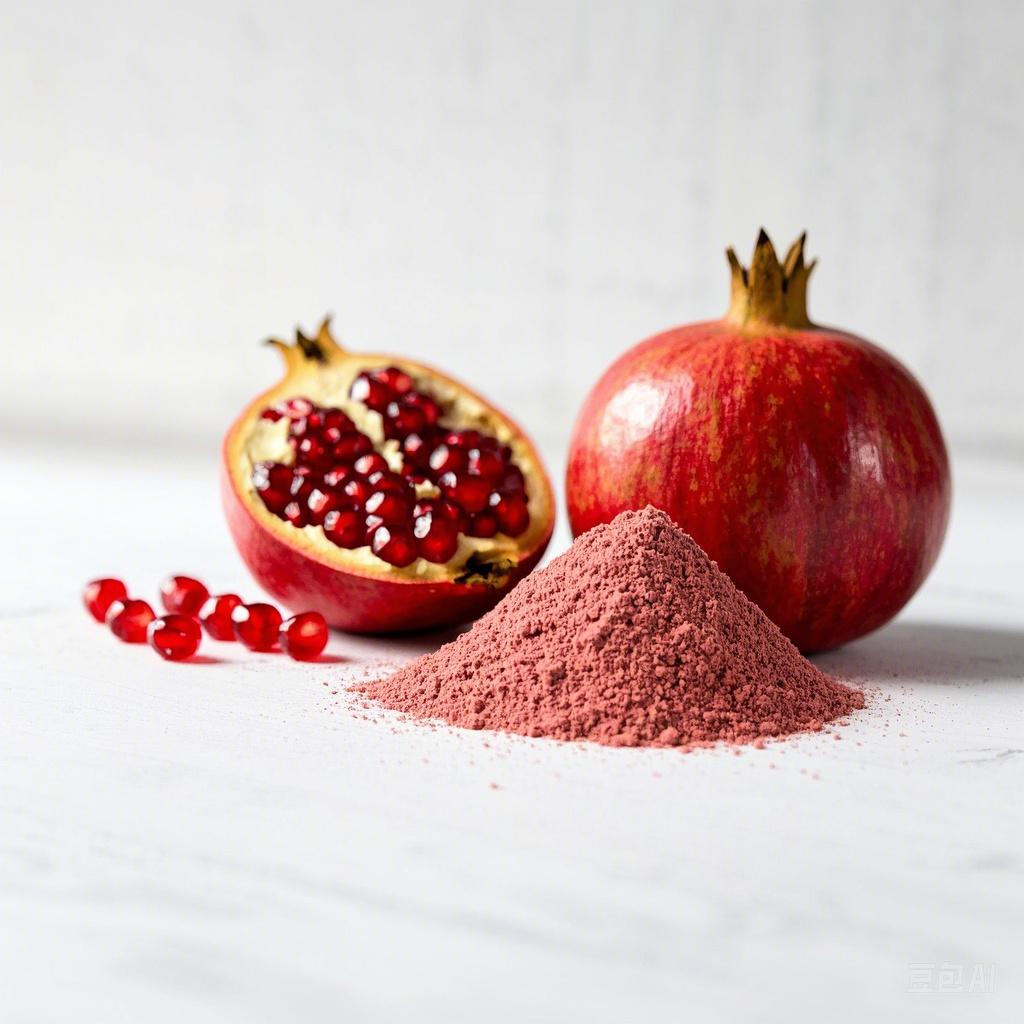Pomegranate flour comes from dried and ground pomegranate fruit and can be used for a variety of purposes, including:
Nutritional Supplement: Pomegranate powder is rich in antioxidants, vitamins (especially vitamin C), and minerals. It is often used as a dietary supplement to enhance overall health and immunity.
Culinary Uses: Add to smoothies, yogurt, oatmeal, and baked goods for a flavor and nutritional boost. It can also be used as a natural food coloring or flavoring in a variety of dishes.
Health Benefits: Pomegranate powder is believed to have anti-inflammatory properties and may benefit heart health, improve digestion, and promote skin health. Some studies suggest it may help reduce the risk of certain diseases
Cosmetic Applications: Due to its antioxidant properties, pomegranate powder is sometimes used in skin care products and DIY beauty treatments to promote skin health and fight signs of aging.
Traditional Medicine: In some cultures, pomegranate powder is used in traditional medicine for its potential health benefits, including digestive health and as a treatment for various ailments.
Weight Management: Some people use pomegranate powder as part of a weight management plan because it may help regulate metabolism and reduce appetite.
When using pomegranate powder, it’s important to consider the quality and source of the product, as well as any dietary restrictions or allergies.
How to drink pomegranate powder?
There are many ways to consume pomegranate powder. Here are some common ways to consume pomegranate powder:
Mix with Water: The easiest way to prepare pomegranate powder is to mix one or two teaspoons of pomegranate powder with one cup of water. Stir thoroughly until the powder is completely dissolved. You can adjust the amount of powder to suit your taste.
Smoothies: Add pomegranate powder to your favorite smoothie recipe. It pairs well with fruits like bananas, berries, and spinach, boosting both flavor and nutritional value.
Juice: Mix pomegranate powder into juice, such as orange or apple juice, to add flavor and health benefits.
Yogurt or Milk: Stir pomegranate powder into yogurt or milk (dairy or plant-based) for a nutritious snack or breakfast.
Tea: You can add pomegranate powder to herbal or green tea. Simply stir while the tea is still hot to enjoy its delicious taste and health benefits.
Protein Shake: If you use protein powder, consider adding pomegranate powder to your protein shake for an added boost of antioxidants.
Oatmeal or Porridge: Stir pomegranate powder into your breakfast oatmeal or porridge for added flavor and nutrition.
When taking pomegranate powder, it’s recommended to start with a small amount and gradually increase the dosage to see how your body responds. Always check the product label for serving size recommendations.
Is pomegranate powder just as good as the juice?
While both pomegranate powder and pomegranate juice offer health benefits, there are some differences between them in terms of nutritional content and uses. Here’s a comparison:
Nutritional Information:
Pomegranate Powder: Pomegranate powder concentrate retains many of the nutrients found in the whole pomegranate, including fiber, vitamins, and antioxidants. The drying process preserves these nutrients, but some nutrients may be lost compared to fresh-squeezed juice.
Pomegranate juice: Because pomegranate juice is extracted from the fruit, it is generally low in fiber. However, it is rich in antioxidants, especially punicalagins and anthocyanins, which have health benefits.
Antioxidant Level: Both pomegranate powder and pomegranate juice are rich in antioxidants, but the concentrations may vary. Some studies suggest that pomegranate powder may have a higher antioxidant capacity due to its concentrated form.
Dietary Fiber: Pomegranate powder is rich in dietary fiber, which aids digestion and helps create a feeling of fullness. Juice is usually lacking in dietary fiber.
Convenient, quick, and versatile: Pomegranate powder has a wide range of uses in cooking and baking, while pomegranate juice is often used as a beverage. Pomegranate powder can be easily added to smoothies, yogurt, or baked goods.
Sugar Content: Pomegranate juice can be high in naturally occurring sugars, which may be a concern for those who are managing their sugar intake. Pomegranate powder is generally lower in sugar per serving.
In summary, pomegranate powder and pomegranate juice each offer unique benefits. If you’re looking for a concentrated source of dietary fiber and nutrients, pomegranate powder may be a better choice. If you prefer a refreshing beverage and enjoy the flavor of juice, pomegranate juice is also a good option. Ultimately, incorporating both into your diet can offer a range of health benefits.
Can you mix pomegranate powder with water?
Yes, you can definitely mix pomegranate powder with water! This is one of the easiest and most common ways to consume pomegranates. Here’s how:
Measure the Powder: Start by adding about 1 to 2 teaspoons of pomegranate powder, depending on your taste preference and desired concentration.
To mix with water: Add powder to a glass of water (approximately 8 oz).
Stir thoroughly: Use a spoon or blender to stir the mixture thoroughly until the powder is completely dissolved.
ADJUST TO TASTE: If desired, you can adjust the amount of powder or add sweetener (such as honey or agave syrup).
This method allows you to enjoy the benefits of pomegranate powder in a refreshing beverage.
Contact:Tony Zhao
Mobile:+86-15291846514
WhatsApp:+86-15291846514
E-mail:sales1@xarainbow.com
Post time: Aug-15-2025


